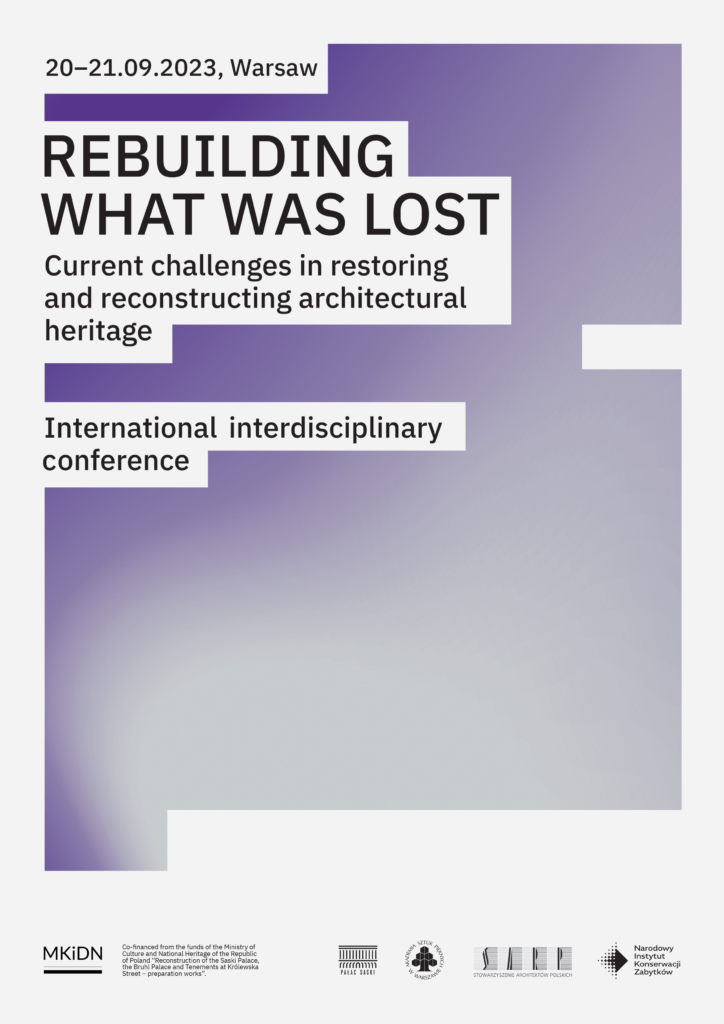CFP for “Rebuilding What Was Lost. Current Challenges in Restoring and Reconstructing Architectural Heritage” Conference
Academics, researchers, and specialists are cordially invited to participate in the international interdisciplinary conference titled "Rebuilding What Was Lost. Current Challenges in Restoring and Reconstructing Architectural Heritage". The event, which will be held on 20 and 21 September 2023 in Warsaw, is organised by Pałac Saski sp. z o.o. – the company tasked with rebuilding the Saski and Brühl Palaces in Warsaw – together with the Academy of Fine Arts in Warsaw. The conference partners are the Association of Polish Architects SARP and National Institute for Monument Conservation.

The topics of the conference revolve around the themes of restoration and reconstruction of historically significant sites. In the wake of the many dramatic events of the 20th century, the international community was faced with the challenges of protecting the world's tangible and intangible heritage. During this time, particularly because of armed conflicts, a whole range of sites of exceptional importance to both local communities and to humanity in general were lost.
Decisions to rebuild architectural heritage were taken not only immediately after the destruction and the end of hostilities, as was the case for example with the reconstruction of the Old Town in Warsaw after World War II, but also decades later, where the Berlin Palace, completed in 2020, can serve as an example. Today, this trend also includes the reconstruction of the Saski Palace, the Brühl Palace and three townhouses on Królewska Street in Warsaw – buildings that formed the western frontage of today's Piłsudski Square (Plac Marsz. Józefa Piłsudskiego) and which were deliberately destroyed during World War II.
These issues seem particularly relevant in the context of the destruction of historic buildings we are currently witnessing. The war waged by Russia against Ukraine brings, first and foremost, the loss of human life, but also the deliberate destruction of heritage which cements the society and conveys its history and identity.
The international “Rebuilding What Was Lost” conference presents an opportunity to discuss issues related to the reconstruction of historic buildings or buildings that are designed in a historic form, such as conservation and architectural or urban planning challenges. It is also worth posing a question about the added value of initiatives aiming to restore destroyed buildings – not only in Poland, but above all worldwide – and to look at the challenges faced by the projects which incorporate historical buildings into the contemporary urban fabric while respecting the cultural and historical identity of local residents.
The following areas of interest will be discussed at the conference:
- Saski Palace, Brühl Palace – the value of reconstruction and the reconstruction of values: the ongoing process of rebuilding the Saski and Brühl Palaces in Warsaw is the largest reconstruction project in Poland in many decades. A panel discussion will identify the opportunities and challenges facing the project. A special place in the discussion may hold an analysis of the impact of the reconstruction on its immediate surroundings, the city and perhaps the country from an economic, social, or cultural point of view. It is also worth looking into the historical context of the reconstruction of the western frontage of Piłsudski Square – the restoration of buildings associated with events important to the fate of the Polish state in the inter-war period.
- Historical architecture in contemporary urban setting: the issue of correlating historical buildings with contemporary urban development and the needs of modern society. The panel proposes to consider the opportunities and challenges facing reconstruction and rebuilding projects within the contemporary urban fabric. Can historical and historicising architecture meet current social and functional needs and satisfy building standards without too many concessions? Examples of rebuilding and reconstruction of historic buildings in recent years – good practices.
- Traditional craftsmanship versus contemporary restorations: using traditional techniques in contemporary architectural developments. How to involve specialists in traditional crafts? Are restoration and reconstruction projects of historic buildings an opportunity to save the disappearing crafts? Which conservation and craft techniques are applicable to reconstructions and restorations?
- Functions and social perception of reconstructed buildings: what is the impact of ongoing reconstruction projects on local communities? Presentation of examples of forms of public participation in reconstructions. How can the functions of historic buildings affect their reception by local communities? Can rebuilding and restoration projects have a positive long-term impact on their surroundings?
The event is open to professionals from various fields interested in the thematic scope of the conference. Conference proceedings will be published after the event.
Deadline for submissions: 26 July 2023.
The Organising Committee reserves the right to select submissions; qualified speakers will be informed of their participation by 15 August 2023.
Scientific Committee of the conference: dr Izabela Bogucka, prof. dr hab. Wojciech Fałkowski, prof. dr hab. Jakub Lewicki, prof. dr hab. Błażej Ostoja Lniski, dr Jarosław Sellin, dr hab. inż. arch. Anna Wierzbicka, Professor at the Warsaw University of Technology, dr hab. Rafał Wiśniewski, Professor at the Stefan Wyszyński University.
Co-financed from the funds of the Ministry of Culture and National Heritage of the Republic of Poland "Reconstruction of the Saski Palace, the Brühl Palace and tenements at Królewska Street - preparation works".